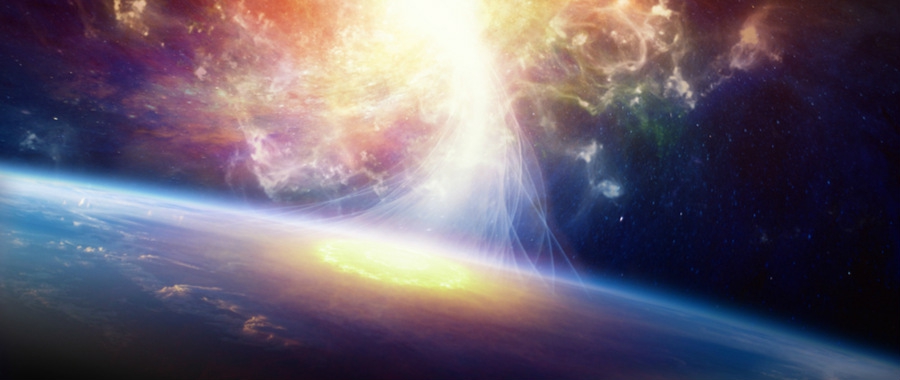The views expressed in our content reflect individual perspectives and do not represent the authoritative views of the Baha'i Faith.
The Baha’i teachings describe the source of power which emanates from the messengers of God, and thus all religious dispensations, as the Holy Spirit:
Whenever [the Holy Spirit] appears, it invests the world of humanity with a new life and endows human realities with a new spirit. It clothes all existence with a glorious attire, disperses the darkness of ignorance, and causes the light of human perfections to shine resplendent.
That spirit is the ultimate revealer of truth and certainty — but at the same time, the Baha’i teachings say, religious traditions of the past are fallible. How can both be true?
Abdu’l-Baha’s answers to that question involve the general movement and progressive nature of all the revelations of God. Every messenger of God starts a new cycle, bringing a new infusion of the Holy Spirit and its spiritual powers into all of creation. However, as each religion wanes over time, the infusion and power of the Holy Spirit dissipates and stagnates, no longer capable of engendering change. In other words, just as all living things and beings are susceptible to the principles of disintegration and atrophy, the creative impulse and vitality of religion, within the context of time and space, is also subject to the processes of disintegration; therefore, religion must experience a rebirth from time to time. Abdu’l-Baha used a seasonal metaphor to illustrate this point:
O ye loved ones of God! The wine-cup of Heaven overfloweth, the banquet of God’s Covenant is bright with festive lights, the dawn of all bestowals is breaking, the gentle winds of grace are blowing, and out of the invisible world come good tidings of bounties and gifts. In flower-spangled meadows hath the divine springtime pitched its tents, and the spiritual are inhaling sweet scents from the Sheba of the spirit, carried their way by the east wind. Now doth the mystic nightingale carol its odes, and buds of inner meaning are bursting into blossoms delicate and fair.
Abdu’l-Baha’s reference to acquiring knowledge through tradition refers to religion as a social ideology; over time, it has the potential to lose its vitality and span of influence, leaving only the sedimentary elements of its original inspiration in cultural and traditional forms. Abdu’l-Baha refers to the Holy Spirit as the progressive process of religious renewal, to the constant marching of the human spirit, to the dialectic of renewal and disintegration. Wherever and whenever religion is crystallized into dogma, the Holy Spirit disappears. The reality of religion is not only the rules and laws that it brings for society, but also the power of transformation and change it carries.
RELATED: A New Way to Comprehend the Holy Spirit
As the potency of the past religions declined, the empirical-rational worldview freed human society from the bonds of ignorance and superstition. Our modern world, however, has also experienced a spiritual malaise and the inversion of values. Abdu’l-Baha’s analysis does not reverse the course of scientific research or suggest two separate truths—one scientific and one spiritual. Instead, he urged us to remove the shadow of materialism from the process of inquiry. Within this context, he defined the role of the Holy Spirit as having two functions: the first being to advance the spiritual nature of man and the dynamics of its transformation, and the second to generate the vision of an emerging worldview that directs human society toward greater degrees of unity and reciprocity and higher expressions of altruistic behaviors.
That combination of individual and social transformation allows the process of inquiry to reflect truth and reality progressively, without the limitations imposed by the selfish ego. We can deduce from the writings of Abdu’l-Baha that objective knowledge is a myth, and that the process of acquiring knowledge is intimately linked with the values of the individual researcher. The search for truth, therefore, incorporates an ethical element, a reflection of the refinement of human character. Free inquiry in this scheme of extended epistemology necessitates a detachment from human desires, the renunciation of self and a casting aside of prejudices and personalities. The integration of sense perception, reason, tradition, and the Holy Spirit becomes potentially possible if presented within the dynamic context of the ever-advancing nature of the search for truth, and if seen as infused with an evolving moral agency.
RELATED: 4 Ways of Knowing According to the Baha’i Teachings
Abdu’l-Baha’s statements in “Some Answered Questions” provide a framework for the development of a comprehensive method or paradigm of inquiry. In this paradigm the dynamic interactions among sense, reason, tradition, and the Holy Spirit should be viewed as a single process, grounded in empirical-analytic sciences, historical search of humanity for meaning, and the common spiritual thread underlying world religions. The great dialogue among these disciplines inevitably results in a grand theory of human salvation.
The Baha’i approach to acquiring knowledge is based on the principle that the universe has a spiritual dimension. This spiritual dimension, however, needs and uses the instrument of the physical reality, perceived through the senses, to objectively manifest its concealed potentialities. Therefore, it can be said that a comprehensive method of inquiry, which acknowledges the spiritual reality, would begin with sense perception, and then seek further refinement as it is complemented by other methods of acquiring knowledge. Abdu’l-Baha asserted that the Baha’i method of inquiry has its roots or foundations in the empirical world as well as in the metaphysical domain. In this physical plane of existence, all the content of knowledge is contextualized in history and social evolution. The nature of reality is spiritual, but our methods of comprehending that reality begin with the natural world.
















Comments
Sign in or create an account
Continue with Googleor